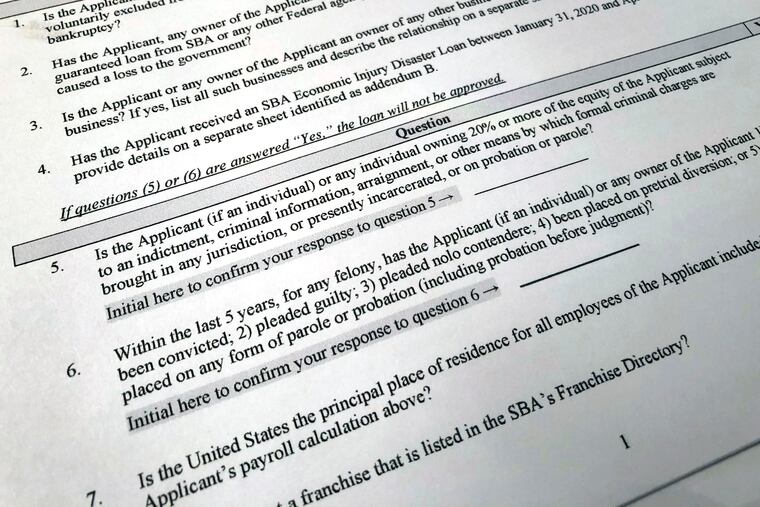Experts predict widespread fraud in SBA loans. Here’s how small-business owners can protect themselves
“There will be stories of abuse of these funds,” says Cherry Hill tax attorney Todd S. Unger. “I guarantee it.” Why? It’s because most of the application is self-certified. And nobody is really checking at the moment. But that could change in the years ahead.

Has your small business applied for a Paycheck Protection Program loan under the CARES Act? Or is planning to apply? I hope you succeed in getting those forgivable loans. But more important, I hope that the information you’re providing to receive that money is on the up and up.
“If you knowingly make a false representation to a federally insured financial institution, that can be considered bank fraud,” says Jed Silversmith, a lawyer at Blank Rome LLP in Philadelphia. “It carries mandatory jail time and the statute of limitations is 10 years.” Silversmith says that, as a felony, bank fraud is “about as serious as it gets.”
The Paycheck Protection Program, which ran out of funds last week but is being replenished by Congress this week, has already provided billions of dollars of assistance to hundreds of thousands of small businesses around the country. But one has to ask: Did they all deserve the money?
Of course, the many small businesses that suffered forced shutdowns and dramatic revenue drops due to the pandemic are the targeted beneficiaries of this program. But unfortunately, like TARP, federal aid after Hurricane Sandy, and similar other government programs, it’s likely that some small-business owners received their money fraudulently.
All focus now is on getting those funds to the small-business owners in genuine need as soon as possible. But my bet is that, months from now, we will be reading of many cases where small-businesses owners took more money than they should have — some unaware and some fully aware of their actions.
“There will be stories of abuse of these funds,” says Cherry Hill tax lawyer Todd S. Unger. “I guarantee it.” Why?? Because the process for getting these loans has lots of room for interpretation.
When a business owner applies for a Paycheck Protection loan, the application is made through a financial institution, which needs documentation to support the request. Some of this information comes from tax returns. But most of it is from user submitted representations and prior years’ financial numbers that are “good faith estimates.” . That data undergoes little scrutiny from the banks. It is passed through to the Small Business Administration, which ultimately approves the loan.
Even with federal approval, many banks were uncomfortable with this process. “The whole thing was done very quick and back of the envelope,” Unger says. “The changing of regulations spooked a lot of banks and most of the application is self-certification, where very few documents were required, and that’s why a lot of big banks were fearful of accepting applications.”
Even after the Small Business Administration approves the loan, the bank still has the final say, but according to many bankers I spoke to, getting federal approval means they’re getting a federal guarantee so in just about all cases they would move ahead with issuing a final promissory note to the borrower to expedite the receipt of funds.
All of this creates an environment that makes it fairly easy for the unscrupulous applicant to game the system. How?
By inflating payroll numbers to receive — and get forgiveness for — far more than what’s deserved. By taking the money and using it for purposes other than payroll, such as buying stocks or property. By accepting loans for multiple businesses that are owned, and controlled, by the same stockholder to slip under the “affiliation” rules requiring that only companies with fewer than 500 employees are eligible. By making up incorrect facts about the pandemic’s hardship on their business and then accepting funds when it’s not really needed because ... hey, why not?
According to Colin Devlin, a lawyer at Philadelphia’s Lex Nova Law LLC, some of this may not be the fault of the business owners. In their rush for money, many may have been forced to take liberty with some of the information they provided. “There was such a gold rush to apply for these loans as evidenced by the funds running out so quick, and because of that, there was a lot of confusion and ambiguities by both borrowers and lenders,” he says.
But the consequences for the business owners who get caught could be catastrophic. Bank fraud is a serious felony. So how can applicants stay out of trouble? Two big things.
The first is to be true and accurate in your representations. Don’t make false statements or ask for more money than you need. “One of the certifications is that you’re certifying that the loan is necessary to support your ongoing operations,” Devlin says. “By not using the funds for those purposes, you’re exposing yourself to fraud.”
Also, track your money carefully. All three lawyers I spoke to recommended setting up a separate bank account to receive and disburse funds so that the money is segregated and can be accounted for in case of an audit. Maintain records for at least 10 years.
If history repeats itself, it’s likely that once this pandemic ends, there will be investigations into how the CARES Act money was used. If you’re a small-business owner, don’t think that you’re too small to get noticed.
“The government is really going to go after people that try to take advantage of this program,” Devlin says. “It’s pretty evident they’re going to go after anyone that took malicious advantage.”